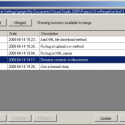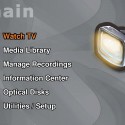
A friend brought over a Compaq Presario x1000 with a temperamental power button (which took many many presses to turn on), so I agreed to have a look.
First thing I did was disassemble it, which I didn’t really document. I took the back (partially) off, which I don’t think helped – really, the bezel above the keyboard (where the power button is) is important, and a couple screws in the back to take the keyboard off are probably all you need.

I just created a Google Code project for a quick and dirty little app I built, SvnMergeGui. As you may suspect, it’s a GUI to SvnMerge.
It uses ClickOnce for the installation (because it was really easy to do from VisualStudio), and is pointed at the svn repository for updates – so although I’ve never tried it, the theory is that it will have automatic updates built-in. You can download the install files from the project page linked above.
I’ve posted my php sendmail wrapper before, but I just noticed that Ilia Alshanetsky has written a php mail logging patch that essentially does the same thing, but from within PHP itself. This is nice because it can log the full path of the file and line where mail() was called, whereas my script can only log as much info as PHP passes to sendmail (which isn’t very much) and what it can get from the environment.
I haven’t posted here in a while, so I just thought I’d mention something about freePBX 2.2.0, which was just released a couple days ago. For those that don’t know, freePBX is an open source configuration and web-based interface to Asterisk, which allows you to configure and run a PBX that has the equivalent functionality to commercial PBXs costing several thousands of dollars (or more). I’ve been involved with the freePBX project since December 2004 (when it was called AMPortal, or AMP for short), and minus a 6 month hiatus in early 2006, I have been contributing to the project ever since.

I have been using MythTV in my living room for the last couple of months, and it’s quite a nice setup. Originally, I got it as a media player after the DSM-320 didn’t live up to my expectations (it’s still usable, but it’s been relegated to the 13″ TV in the bedroom).
We don’t actually subscribe to cable, and only get a few network channels that ‘leak’ through from the cable internet, so I never really intended it to act as a PVR.

I spent some time recently trying to find a new keyboard, since my old one has had enough spilled on or in it over the years that it was uncleanable (still worked fine, but it was getting pretty gross). Now, I don’t know what keyboard designers are on these days, but they’ve made it an incredibly difficult and frustrating task.
I don’t have any special keyboard needs, I usually just buy the basic el-cheapo keyboard that gets the job done.
AppleInsider is running an article saying that Macs are only 13% more than a comparable windows desktop, or 10% for a comparable notebook. They did this research to squash the notion that Macs are way more expensive than PCs.
One of my problems is the cheapest Mac – the Core Solo – is still $699 CAD. At my local computer store, you can buy a basic PC for $279 plus $120 for a copy of Windows XP Home.
I strongly believe that for any backup system to work, it needs to be automated and basically maintenance-free. People are just lazy, and having non-automated backups is a recipe for disaster. I believe Moore’s Law applies to backups: The day you need your backups is the day after you forgot to make them.
This particular article will only deal with one component of a backup system: keeping differential or historical copies of files.
Something that really boggles my mind: Why do all the distros still push their 3 or 7-CD or DVD sets as the main way to download them? It’s 2006 for crying out loud. My distro of choice these days is debian, and I’ve been using the net-install ISO for a couple years now.
Waste of Bandwidth
Most distros come with, well basically, everything. Interestingly, most people use one desktop environment. One internet browser.
The much-anticipated Zend Framework was released a couple of days ago, and I finally got around to looking at it today. I really wasn’t impressed much.
It’s really not much more than PEAR, with a sloppy MVC framework tacked on. I certainly don’t think it’s not a useful library: the Zend_InputFilter class looks very handy, and the Zend_Db stuff is an interesting implementation (though, I’m not sure if I’ll be switching away from ADOdb anytime soon).

I just got a new Dell Inspirion 6000 to replace my older Inspirion 1100. There was a nice promo on the 6000, and I have a Pentium-M 740, 1GB of RAM, and a 60GB hard drive, as well as integrated Wireless b/g, bluetooth, a DVD writer (not that I will ever use this in a laptop..) and a 15.4″ widescreen LCD.
The first thing I did was try to install our corporate copy of Windows 2000 Professional, to bring it inline with the rest of the systems at work.
I’ve been getting a ton of comment spam today, but it’s very strange spam. All the links go to different places (Forbes, Bloglines, Sciencedaily) that don’t seem like the types to be comment spamming.
Usually the first sentence or two is something like “Found your site very useful”, “Cool site! Be back soon!”, followed by some nonsensical sentences with the links to these weird sites. I got about a dozen of them, all posted around 10-20 minutes apart.
We had some spam problems last week, one of them caused by a form that wasn’t properly escaped. While that problem was fixed, the real problem was that it was hard to figure out what script had the issue.
To solve this, I wrote a sendmail wrapper for use by PHP (though really it could be used by anything) that logs the message along with the date, a message id (also inserted in th e headers) and the current directory (which gives the location of the original script).
Something that seems to be missing from searches is time. Search engines base their results on relevancy, which makes finding newer methods of doing something difficult.
For example, I will search for how to do something in linux, like configuring a RAID array. There is a ton of information on this, but the most relevant hits you get are about configuring raidtools. Mdadm has replaced raidtools as the tool of choice, but since raidtools has been around so long, and there are so many old pages that link to it, it scores the highest.
I’ve noticed in the last little while that there seems to be a trend happening with web services: people think SOAP is too complex. I keep coming across articles and comments talking about how web services are just over engineered. I have to say, I totally agree.
Here’s some excripts from a c|net article:
A debate is raging over whether the number of specifications based on Extensible Markup Language (XML), defining everything from how to add security to where to send data, has mushroomed out of control.
Finally got around to updating some of my Firefox plugins, and noticed a neat new enhancement to the Google toolbar. When you’re typing in the search bar, they added a ‘suggest’ feature (where it finishes words and complete search phrases for you), and even better (since suggest isn’t really new), is it shows you the number of results. (googlebar image) Even though there is a google search bar built in to Firefox, I still really like the toolbar.
 A friend brought over a Compaq Presario x1000 with a temperamental power button (which took many many presses to turn on), so I agreed to have a look.
First thing I did was disassemble it, which I didn’t really document. I took the back (partially) off, which I don’t think helped – really, the bezel above the keyboard (where the power button is) is important, and a couple screws in the back to take the keyboard off are probably all you need.
A friend brought over a Compaq Presario x1000 with a temperamental power button (which took many many presses to turn on), so I agreed to have a look.
First thing I did was disassemble it, which I didn’t really document. I took the back (partially) off, which I don’t think helped – really, the bezel above the keyboard (where the power button is) is important, and a couple screws in the back to take the keyboard off are probably all you need. I just created a Google Code project for a quick and dirty little app I built, SvnMergeGui. As you may suspect, it’s a GUI to SvnMerge.
It uses ClickOnce for the installation (because it was really easy to do from VisualStudio), and is pointed at the svn repository for updates – so although I’ve never tried it, the theory is that it will have automatic updates built-in. You can download the install files from the project page linked above.
I just created a Google Code project for a quick and dirty little app I built, SvnMergeGui. As you may suspect, it’s a GUI to SvnMerge.
It uses ClickOnce for the installation (because it was really easy to do from VisualStudio), and is pointed at the svn repository for updates – so although I’ve never tried it, the theory is that it will have automatic updates built-in. You can download the install files from the project page linked above. I have been using MythTV in my living room for the last couple of months, and it’s quite a nice setup. Originally, I got it as a media player after the DSM-320 didn’t live up to my expectations (it’s still usable, but it’s been relegated to the 13″ TV in the bedroom).
We don’t actually subscribe to cable, and only get a few network channels that ‘leak’ through from the cable internet, so I never really intended it to act as a PVR.
I have been using MythTV in my living room for the last couple of months, and it’s quite a nice setup. Originally, I got it as a media player after the DSM-320 didn’t live up to my expectations (it’s still usable, but it’s been relegated to the 13″ TV in the bedroom).
We don’t actually subscribe to cable, and only get a few network channels that ‘leak’ through from the cable internet, so I never really intended it to act as a PVR. I just got a new Dell Inspirion 6000 to replace my older Inspirion 1100. There was a nice promo on the 6000, and I have a Pentium-M 740, 1GB of RAM, and a 60GB hard drive, as well as integrated Wireless b/g, bluetooth, a DVD writer (not that I will ever use this in a laptop..) and a 15.4″ widescreen LCD.
The first thing I did was try to install our corporate copy of Windows 2000 Professional, to bring it inline with the rest of the systems at work.
I just got a new Dell Inspirion 6000 to replace my older Inspirion 1100. There was a nice promo on the 6000, and I have a Pentium-M 740, 1GB of RAM, and a 60GB hard drive, as well as integrated Wireless b/g, bluetooth, a DVD writer (not that I will ever use this in a laptop..) and a 15.4″ widescreen LCD.
The first thing I did was try to install our corporate copy of Windows 2000 Professional, to bring it inline with the rest of the systems at work.